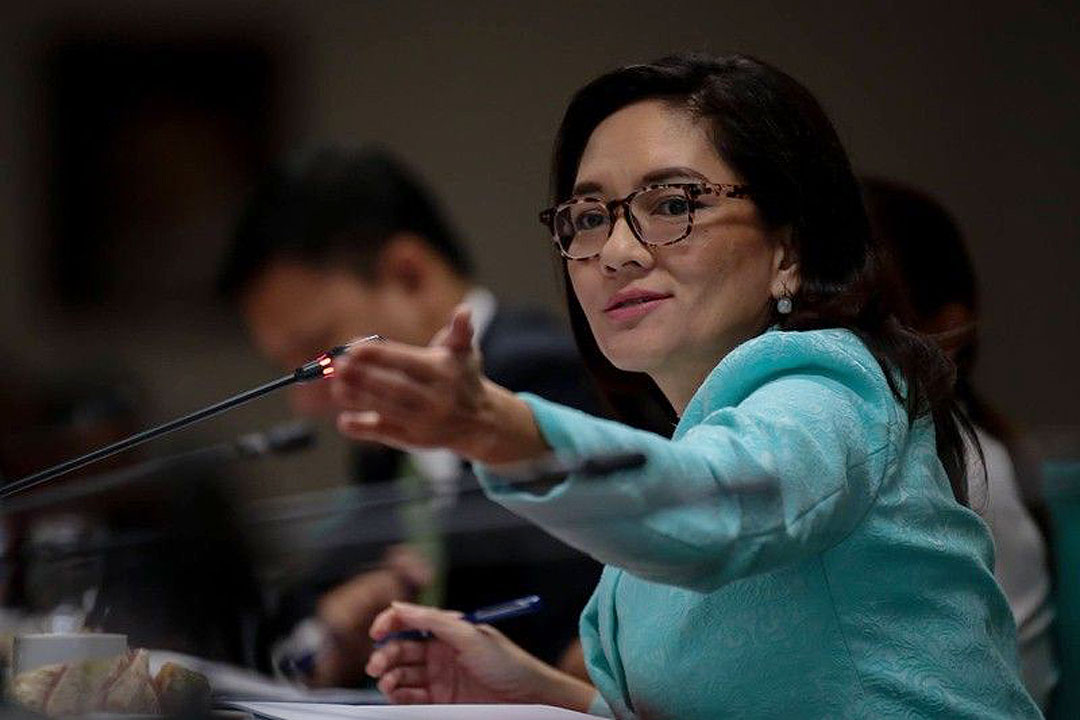Senator backs go-slow approach to RCEP, says Philippines not ready

By Alyssa Nicole O. Tan
IT IS NOT an urgent matter to quickly approve the Regional Comprehensive Economic Partnership (RCEP) treaty, Senator Ana Theresia N. Hontiveros-Baraquel said, noting that parts of the economy that could potentially lose out need more time to prepare.
“Even if we don’t ratify RCEP immediately, we would actually still continue to trade as we are trading today; maybe RCEP will not really change anything,” Ms. Hontiveros-Baraquel said in plenary session late on Wednesday. “We can already export to all other RCEP countries under the WTO (World Trade Organization) rules and also our existing free trade agreements (FTAs) that we already have with all other RCEP countries.”
She declared her support for an approach that gives more time to prepare and equip the “losers from our sectors to withstand that impact and eventually to get more out of something like RCEP.”
The RCEP has been ratified by 11 countries — Brunei, Cambodia, Laos, Singapore, Thailand, Vietnam, Australia, China, Japan, South Korea, and New Zealand — and started going into effect since the beginning of January.
Ms. Hontiveros-Baraquel questioned whether a cost-benefit analysis on the treaty has revealed all the possible downsides, to which Senator Aquilino Martin L. Pimentel III, who chairs the Foreign Affairs committee, replied: “The terms of the RCEP have been negotiated for more than eight years, so that’s how long it’s been discussed and studied.”
One of the many advantages of the RCEP, he said, is the rules of origin, in which the 15 member states comprising the ASEAN-led free trade agreement are treated as one economic region. This will result in liberalized tariff rates for eligible products. He cited the potential benefits of a simplified trade process as all members are covered by a single set of rules.
“Even though we have existing FTAs, RCEP is an improvement,” he added.
Ms. Hontiveros-Baraquel said a number of agricultural groups have said government agencies have not been “fully forthright” about the treaty’s potential threats to the fishing and farming industries.
She quoted Federation of Free Farmers (FFF) President Leonardo Q. Montemayor, who said the RCEP approval effort “highlight(s) its benefits in terms of market access opportunities (but) conveniently downplays, if not deliberately conceals (a) crucial caveat that any tariff concession from our trading partners under RCEP will not be exclusive to the Philippines, and will in fact be available to all other RCEP member countries. This means that there is no guarantee that we will be able to avail of and benefit from such opportunities especially if competing countries who are also part of RCEP are more competitive, dependable, and efficient than us.”
Citing peer-reviewed research from the Global Economic Governance Initiative, Ms. Hontiveros-Baraquel said the imports will grow at a faster rate than exports if the Senate ratifies the RCEP in its current form. “We would permanently lose $58 million per year in tariff revenue.”
She estimated that the balance of trade in goods will worsen by about $264 million, citing calculations performed using the World Bank Methodology and evaluating the actual liberalization required by RCEP.
In response, Mr. Pimentel said the Trade department has presented its own studies indicating favorable outcomes.
“The spirit of a free trade agreement is a give and take, open your market, and I will also open my market,” he said, “so the lessening of tariff collections would be a necessary consequence, but then that should be made up for by the overall benefits of the agreement.”
RCEP concurrence, he added, would drive gross domestic product growth above 6%, foreign direct investment growth of 49%, and export growth of up to 15%, citing the results of the Department of Trade and Industry (DTI) studies.
It is difficult to tell which of the studies will be proven correct in the future, Mr. Pimentel said, but added that the Philippines should learn to “compete with fair rules, equally applicable to all similarly situated.”
Ms. Hontiveros-Baraquel cited the job losses that resulted from accession to the World Trade Organization, which she blamed on lack of readiness for the resulting disruption.
“It is true that not everyone is 100% against the RCEP, but at the very least, they are asking for additional time to prepare,” she added. The member countries of the treaty are “part of the most protectionist economists in the world when it comes to their own agriculture, that’s why it’s not unreasonable for the agricultural and rural sectors to ask for additional time, protection, and support to prepare for real competition, dependability and efficiency.”
“We have highlighted in all the hearings this Philippine exclusion list, this is the list of agricultural products as well as industrial goods where we made no tariff commitment, meaning no change when compared to what we have right now,” Mr. Pimentel said.
The Department of Agriculture (DA) and various other agencies, he added, had worked to protect the interests of the sector, so “that the possible negative effects of the agreement would be minimized if not eliminated.”
In a statement on Thursday, the FFF cited the “inconsistencies” of the government’s tariff policy for agricultural products covered by the RCEP trade agreement.
The DA and DTI have noted that sensitive agricultural products have been excluded from any tariff reduction under the Philippines’ RCEP commitments, such as rice, pork, poultry, sugar, corn, and vegetables.
Outside the context of the looming agreement, however, the government has been unilaterally cutting tariffs on some of these sensitive products.
In April and May 2021, Executive Orders were issued reducing tariffs on pork to contain inflation because of a supply crunch caused by the African Swine Fever outbreak. The executive branch also drastically expanded the minimum access volume for pork imports.
“Since we are voluntarily lowering our tariffs outside the negotiations, we get nothing in return. Our trading partners must be jumping with joy at our generosity, if not, our stupidity,” said the FFF National Manager Raul Q. Montemayor in the organization’s statement.
In interpellation, Ms. Hontiveros-Baraquel and Senator Francis N. Tolentino also cited the potential impact on Philippine laws resulting from accession to the trade deal.
Mr. Pimentel said only Republic Act 8293 needs to be amended after RCEP accession. “This treaty mentions sound marks, and I do not think we have accommodated that in our Intellectual Property Code.”
The only other action required from the Philippines is an executive order to implement the Philippines’ tariff commitments, he said. This would trigger the issuance of circulars by the Bureau of Customs to adjust trade practices according to RCEP requirements.
Mr. Pimentel added that the Safeguard Measures Law or Republic Act 8800 contains the necessary remedies for laws that may be affected by the treaty.
The Philippines may be disadvantaged by being party to the treaty, Mr. Tolentino said, because the Philippines is not party to other treaties like the Hague Service Convention, the United Nations Convention on Contracts for the International Sale of Goods, the Convention on the Use of Electronic Communications in International Contracts.
“I am now zeroing in on the preparedness of the Philippines to ratify this, and even (of) this Chamber, to concur with this treaty,” he said. “There are structural agreements that would have to be in place to really (put) the Philippines on equal standing with the other members.”
In response, Mr. Pimentel said that under the treaty, these conventions will only be “taken into account,” but added that it is not necessary to be a party to them.
Meanwhile, the aerospace industry said the Philippines needs to participate in the RCEP trade deal to benefit from the lower cost of inputs.
Aerospace Industries Association of the Philippines Chairman John T. Lee said participation in RCEP will allow aerospace parts manufacturers and suppliers to take advantage of the trade deal’s benefits.
“The aerospace industry fully supports the RCEP because there are key benefits that cannot be ignored such as lower cost of inputs, convenience in trading with key partners in the region and best of all, the huge market potential in other member countries,” he said in a statement on Thursday.
“The industry is one of the high-value and fast-growing industries in the Philippines with 10% growth in exports of aerospace parts and components in 2015-2019,” he added.
The RCEP trade deal was signed by President Rodrigo R. Duterte on Sept. 2.
Senate deliberations on the treaty will resume on Monday.



